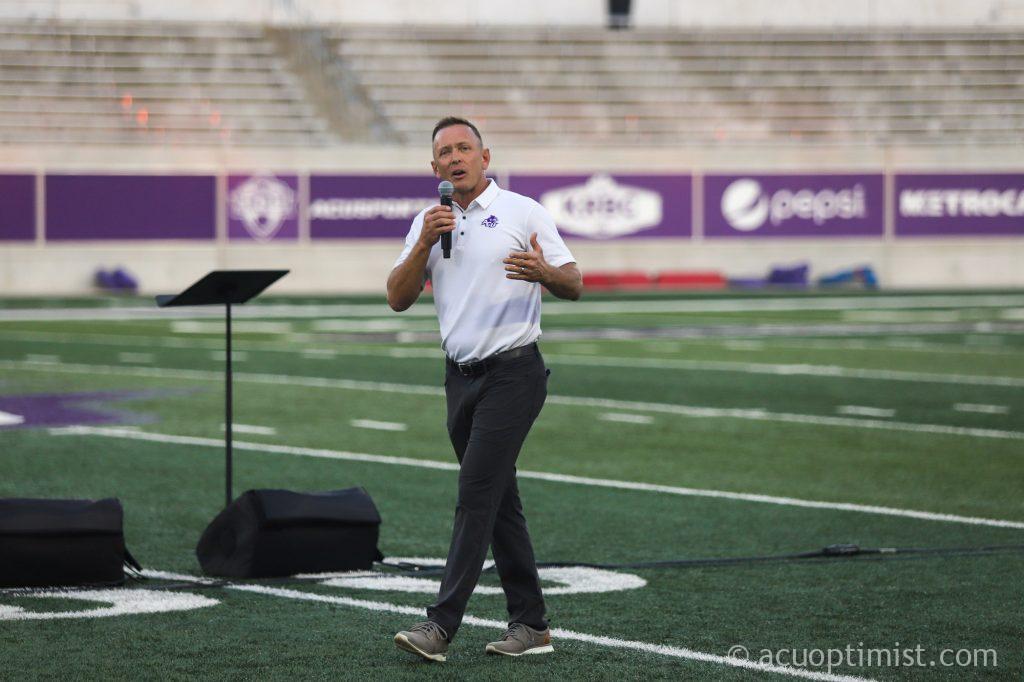Phil Schubert, president of the university, discussed some of the many challenges facing the country that translate in the return to campus.
“I can observe the significant differences that have taken place,” Schubert said Thursday. “The way we’re handling classes has obviously never been so significant.”
The university had been consistently delegating safety protocols throughout the summer. Schubert said there were several factors that created difficulties along the way.
“The most challenging would likely fall under logistics and judgement,” Schubert said. “There were points in this journey where we had to make significant decisions about face-to-face classes or whether to go online. The level of discernment required to make those kinds of decisions is challenging.”
As some universities across the nation are already experiencing outbreaks, ACU has only eight active cases as of Friday. Schubert believes that a possible decision to move back online wouldn’t necessarily be decided by the total active cases.
“I don’t think it’s a number,” Schubert said. “I think at a point where we see the per capita infection rate relative to the size of our community is increasing rapidly and at a rate that might be higher than what the norm of the broader communities, that would clearly be a trigger point.”
While it may be early in the semester, he believes that students taking responsible actions could be the reason behind a low number of positive cases.
“I’ve quite frankly been shocked we haven’t had more positive cases thus far,” Schubert said. “I’m super thankful and hope it’s an indication of the responsibility and maturity of our students that hasn’t been displayed on other campuses.”
A large number of students also have several classes online, creating some frustration with tuition costs for a “partially online experience.” However, Schubert believes that students can still receive enriching experiences.
“I would say that the mode and delivery of the curriculum is one piece of a much more significant college experience,” Schubert said Thursday. “The care and attention we have invested in ensuring the quality of what we have provided is significant. There isn’t, in my opinion, a deterioration in the quality of experience, but I encourage [students] to look more broadly at just that one benchmark.”
Along with coronavirus, racial tensions across the United States have spiked with the killings of several Black Americans across the country.
Schubert addressed the community in an email on June 2 after the killing of George Floyd. However, he drew critics after not using the term “Black lives matter.”
Following the pushback, he met with several faculty and staff members of color. Later on June 5, Schubert addressed the university again but on camera saying “Black lives matter.”
“Those conversations were authentic,” Schubert said. “What I wanted to be clear about early on is there is an organization and a political movement behind the phrase ‘Black lives matter,’ and I wasn’t sure that I understood at a level that I needed to what was inherently attached to those words. My willingness to come back and invest more time was out of a desire to say ‘I don’t fully understand, and I want to understand better.'”
While protests have continued across the nation, Schubert wants to make sure the university is actively focusing on supporting everyone at ACU.
“I want them to know that our Black students and the members of our community how incredibly important they are and how incredibly how hurtful these situations are,” Schubert said. “To those of us who are white who love our Black brothers and sisters, I wanted them to know we stand in solidarity with them.”
Schubert took quick action to address the community to make sure there was no misunderstanding at what the university stands for and believes.
“Saying ‘Black lives matter’ is not an endorsement of a political movement or organization,” Schubert said. “It means what it says and that’s that Black lives matter, and I believe that strongly. I wanted people to know that there was no hesitation on my part or the university that didn’t acknowledge that reality.”

